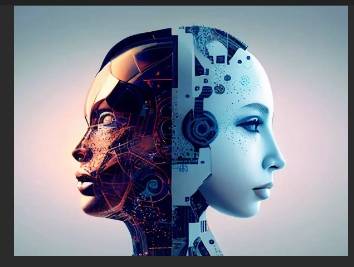Artificial Intelligence (AI) has quickly moved from the
pages of science fiction into our daily lives, influencing various aspects of
how we live, work, and interact. From voice assistants like Siri and Alexa to
personalized movie recommendations on Netflix, AI is transforming modern
society by making tasks easier, faster, and more efficient. This article
explores how AI has become an integral part of our routines, its advantages,
and some of the ethical concerns surrounding its widespread use.
AI in Our Daily
Routines
One of the most notable examples of AI integration in
everyday life is through digital assistants. Virtual assistants such as Siri,
Alexa, and Google Assistant help users perform tasks hands-free, such as
setting reminders, making calls, and even controlling smart home devices like
lights and thermostats. These digital assistants use AI algorithms to
understand human language and respond accurately, creating a seamless user
experience that many have come to rely on.
AI is also prominent in our entertainment choices. Streaming
platforms like Netflix and Spotify use AI to analyze a user’s preferences and
suggest content that aligns with their tastes. By examining patterns in a
user’s behavior, such as what they watch or listen to and at what times, these
platforms can provide a personalized experience that keeps users engaged and
satisfied.
AI in Health and
Wellness
In the healthcare sector, AI is making significant strides
as well. Fitness apps, for instance, track user activities, provide
personalized workout plans, and offer health insights based on data collected
from wearable devices. AI is used to monitor vital signs and give users tips on
improving their health, making wellness management more accessible.
Furthermore, AI-driven diagnostics and predictive analytics are helping doctors
to detect and treat diseases early, potentially saving lives.
AI in Transportation
Transportation has also been revolutionized by AI.
Self-driving cars are one of the most talked-about innovations, with companies
like Tesla at the forefront. Although fully autonomous vehicles aren’t yet
widespread, AI-based features like adaptive cruise control, lane assist, and
automatic braking are becoming more common, enhancing road safety and
convenience. Apps like Google Maps and Waze use AI to provide real-time traffic
updates and suggest the best routes, helping users save time and avoid traffic
jams.
Ethical and Privacy
Concerns
While AI offers numerous benefits, it also raises ethical
concerns. One of the primary issues is privacy. AI systems often rely on vast
amounts of personal data to function effectively, raising questions about how
this data is collected, stored, and used. There are also concerns about the
potential for AI to replace jobs, especially in sectors like manufacturing,
retail, and customer service, where automation could eventually take over many
roles currently performed by humans.
The Future of AI in
Everyday Life
The future of AI promises even greater integration into our
daily lives. From smarter home devices to more efficient healthcare solutions
and personalized educational tools, AI has the potential to bring further
improvements across various sectors. As AI technology continues to advance,
it’s crucial to address the ethical challenges and ensure responsible use to
balance innovation with privacy and security.
The rise of artificial intelligence in everyday life
represents a significant technological shift. While AI has made life more
convenient and connected, it’s essential to consider the ethical implications
and work towards transparent, responsible use of this technology. As AI becomes
increasingly embedded in our routines, society must navigate the challenges
thoughtfully to maximize its benefits for future generations.



No comments yet
Be the first to share your thoughts!